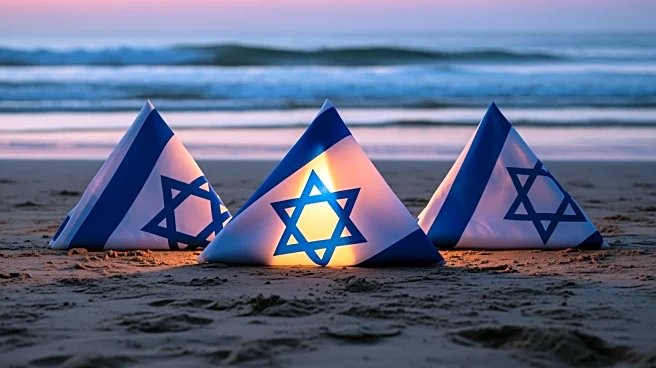What's Happening?
The bodies of three Israeli soldiers, including American-Israeli Capt. Omer Neutra, were returned by Hamas to Israel. This development is part of a U.S.-brokered ceasefire following the deadly conflict
that began with a Hamas-led attack on October 7, 2023. The attack resulted in the deaths of approximately 1,200 people and the abduction of 251 hostages. The ceasefire, which took effect on October 10, has seen the release of 20 hostages' remains, with eight still held in Gaza. The exchange of remains is a key component of the ceasefire agreement, which also includes plans for an international stabilization force to secure Gaza's borders.
Why It's Important?
The return of the soldiers' bodies marks a significant step in the ongoing ceasefire negotiations and highlights the complex humanitarian and political challenges in the region. The exchange of remains is crucial for both sides, as it addresses humanitarian concerns and the emotional needs of families affected by the conflict. The involvement of international forces in securing Gaza's borders could stabilize the region, but it also raises questions about the future governance of Gaza and the disarmament of Hamas. The situation remains delicate, with potential implications for regional security and international diplomatic relations.
What's Next?
The next steps involve the potential deployment of an international peacekeeping force, contingent on a clear U.N. Security Council mandate. Discussions will continue regarding the disarmament of Hamas and the governance of Gaza post-conflict. Humanitarian aid access and the identification of returned Palestinian bodies remain pressing issues. The international community, including the U.S., will likely play a significant role in shaping the future of Gaza and ensuring the ceasefire holds.
Beyond the Headlines
The exchange of remains and the broader ceasefire efforts underscore the ongoing humanitarian crisis in Gaza, where over 68,800 Palestinians have been killed according to Gaza's Health Ministry. The conflict has drawn international scrutiny, with accusations of genocide against Israel, which it denies. The situation highlights the need for a sustainable peace solution that addresses both security and humanitarian needs in the region.











